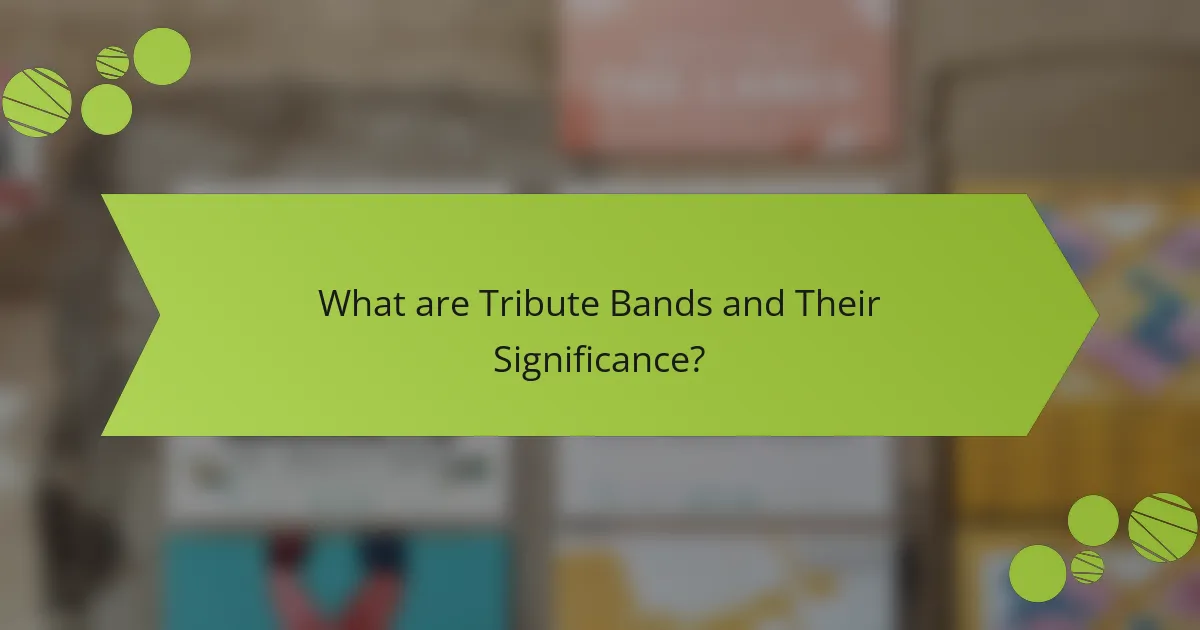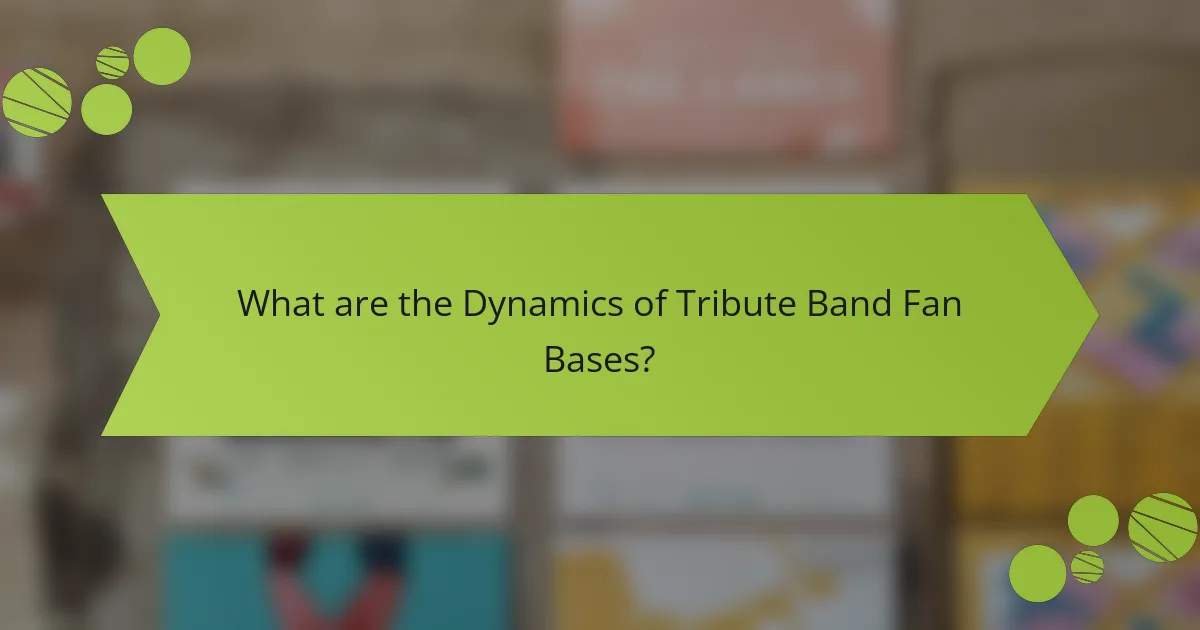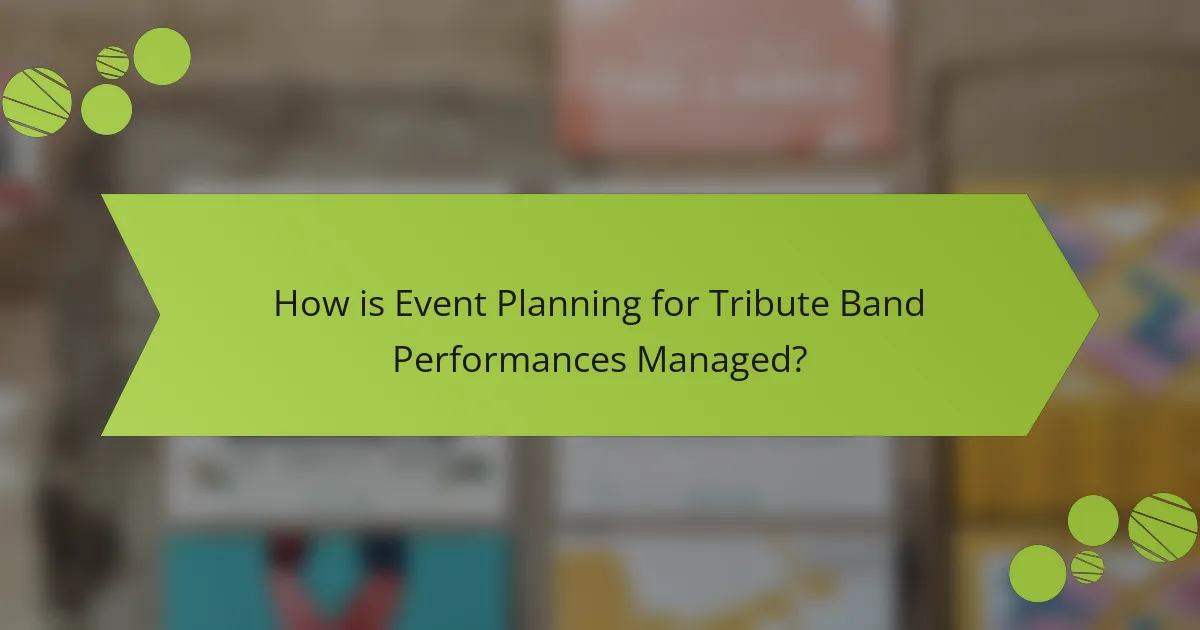Tribute bands are musical groups that replicate the songs, style, and sound of specific artists or bands, creating an experience reminiscent of live performances by the original acts. These bands play a vital role in preserving the legacy of iconic musicians while offering entertainment and nostalgia for fans. The article explores the dynamics of tribute band fan bases, characterized by strong emotional connections and a desire for authentic performances. It also delves into the structured event planning process for tribute band performances, including venue selection, marketing strategies, and collaboration with local businesses to enhance audience engagement and ticket sales.

What are Tribute Bands and Their Significance?
Tribute bands are musical groups that perform songs of a specific artist or band, emulating their style and sound. They aim to recreate the experience of seeing the original act live. Tribute bands often serve as a bridge for fans who wish to relive the music of their favorite artists. They can attract large audiences at events and festivals. The significance of tribute bands lies in their ability to preserve the legacy of iconic musicians. They provide entertainment and nostalgia for fans who may not have had the chance to see the original artists perform. Additionally, tribute bands contribute to the music industry’s ecosystem by offering opportunities for musicians to perform. Their performances can also introduce new generations to classic music.
How do Tribute Bands differ from Original Bands?
Tribute bands primarily perform songs by established original bands, while original bands create and perform their own music. Tribute bands aim to replicate the sound, style, and experience of the original artists. They often attract fans of the original band who seek nostalgic experiences. Original bands focus on songwriting and developing their unique musical identity. Tribute bands may not have the same level of creative freedom as original bands. The market for tribute bands has grown significantly, with many venues specifically booking them for their popularity. Original bands typically have a longer journey to build recognition and a fan base.
What defines a Tribute Band’s authenticity?
A tribute band’s authenticity is defined by its ability to faithfully replicate the sound, style, and performance of the original band. This includes accurate instrumentation, vocal mimicry, and adherence to the original band’s setlist and stage presence. Authentic tribute bands often invest in similar costumes and gear used by the original artists. They also engage in thorough research to understand the nuances of the original band’s music and history. Audience perception plays a crucial role; fans often assess authenticity based on emotional connection and nostalgia. Successful tribute bands can evoke the same feelings as the original, enhancing their perceived authenticity.
How do Tribute Bands pay homage to original artists?
Tribute bands pay homage to original artists by replicating their music and performance style. They perform the original artists’ songs with high fidelity to the original recordings. Many tribute bands focus on specific eras or genres, enhancing the nostalgic experience for fans. They often dress in similar costumes to capture the original artists’ look. Tribute bands may also recreate the stage presence and mannerisms of the original performers. This attention to detail helps in creating an authentic experience for audiences. Some tribute bands even perform at venues that the original artists played. This practice solidifies their role in honoring the legacy of the artists they emulate.
Why are Tribute Bands popular among music fans?
Tribute bands are popular among music fans because they recreate the sound and experience of beloved original artists. Fans often seek nostalgia and familiarity with classic hits. Tribute bands provide an accessible way to enjoy music from iconic bands without the original members. They often perform in local venues, making live music more accessible. Many tribute bands are skilled musicians who capture the essence of the original acts. This authenticity resonates with audiences, enhancing the overall experience. Events featuring tribute bands often attract diverse crowds, creating a communal atmosphere. According to a survey by Eventbrite, 67% of music fans enjoy attending tribute band performances for the fun and nostalgia they offer.
What emotional connections do fans have with Tribute Bands?
Fans of tribute bands often experience deep emotional connections due to nostalgia and shared memories. Tribute bands evoke feelings associated with the original artists, allowing fans to relive significant moments from their past. This connection is often rooted in the music itself, which can trigger powerful emotions and memories.
Fans frequently find a sense of community among others who share similar musical tastes. This camaraderie enhances their emotional experience during performances. The live experience of tribute bands often mimics the atmosphere of original concerts, heightening emotional responses.
Many fans express their connection through passionate engagement, such as singing along and dancing. This active participation fosters a sense of belonging and joy. Research indicates that music can significantly impact mood and emotional well-being, reinforcing the bond fans feel with tribute bands.
How do Tribute Bands create a sense of nostalgia?
Tribute bands create a sense of nostalgia by replicating the music and performances of iconic artists. They perform popular songs that evoke memories for fans. The costumes and stage setups often mirror the original artists’ styles. This visual and auditory mimicry enhances the nostalgic experience. Many fans attend these performances to relive moments from their past. Research shows that music can trigger emotional memories, reinforcing nostalgia. According to a study in the journal “Psychology of Music,” familiar music can elicit strong emotional responses. Tribute bands effectively harness this power to connect with audiences.

What are the Dynamics of Tribute Band Fan Bases?
Tribute band fan bases are characterized by strong emotional connections to the original artists. Fans often seek authenticity in performances, which enhances their experience. These fans typically share a passion for the music and culture of the original band. Social media plays a crucial role in connecting fans and fostering community. Tribute bands often perform in local venues, making them accessible to a wider audience. The demographics of fan bases can vary greatly, spanning different age groups. Many fans appreciate the nostalgia associated with tribute performances. Engagement through fan clubs and events further strengthens these dynamics.
How do Tribute Band fan bases form and grow?
Tribute band fan bases form and grow through shared musical interests and community engagement. Fans are often drawn to tribute bands that replicate their favorite original artists. This connection fosters a sense of belonging among fans. Social media platforms play a significant role in connecting fans. They create online communities where fans can share experiences and discuss performances. Live events also contribute to fan base growth. Attending concerts allows fans to interact and build relationships. Word-of-mouth recommendations further expand the fan base. Studies show that fan engagement increases loyalty and attendance at future events. This cycle of interaction and shared passion solidifies the community around tribute bands.
What role does social media play in fan engagement?
Social media plays a crucial role in fan engagement for tribute bands. It enables direct interaction between fans and artists. Platforms like Facebook, Instagram, and Twitter facilitate real-time communication. Fans can share experiences, photos, and videos from performances. This sharing creates a sense of community among followers. Social media also allows tribute bands to promote events and new releases effectively. Statistics show that 80% of fans engage with artists through social media. This engagement can lead to increased attendance at performances and stronger loyalty among fans.
How do fan demographics influence Tribute Band popularity?
Fan demographics significantly influence tribute band popularity. Different age groups have varying musical preferences. Younger fans may favor contemporary tribute bands, while older audiences often enjoy classic rock tributes. Gender can also impact popularity; some bands attract more male or female fans based on the original band’s appeal. Geographic location plays a role as well; certain tribute bands thrive in areas with strong ties to the original artists. Additionally, cultural background can affect the reception of tribute bands. For example, tribute bands covering iconic local artists may resonate more with regional fans. Understanding these demographic factors helps tribute bands tailor their performances and marketing strategies effectively.
What are the common characteristics of Tribute Band audiences?
Tribute band audiences typically share a passion for the original artists they emulate. Many audience members are fans of the music genre represented. They often range in age, with a significant portion being adults who grew up with the original band’s music. Audience members frequently attend shows in groups, enhancing the communal experience. They exhibit strong enthusiasm and engagement during performances. Many audience members wear merchandise or clothing related to the original band. Research indicates that tribute band audiences appreciate authenticity in performances, seeking a genuine experience. This connection to nostalgia plays a crucial role in their attendance and enjoyment.
How do audience expectations differ between Tribute Bands and original acts?
Audience expectations differ significantly between tribute bands and original acts. Tribute bands aim to replicate the sound and experience of a specific artist or band. Fans expect authenticity in performance, including song selection and stage presence. Original acts, however, focus on presenting unique music and personal artistry. Audience members anticipate new material and creativity from original acts.
Tribute band audiences often seek nostalgia and familiarity. They enjoy reliving past concert experiences through faithful renditions. In contrast, original act audiences look for innovation and emotional connection. They appreciate the opportunity to discover new music and support emerging talent.
Research shows that tribute bands can attract larger crowds due to their established fan base. According to a study by the Journal of Music and Entertainment Industry Educators, tribute acts often have a higher draw in local venues. This indicates that audience expectations are shaped by the perceived value of familiarity versus originality.
What factors contribute to the loyalty of Tribute Band fans?
The loyalty of Tribute Band fans is influenced by several key factors. A strong emotional connection to the original band enhances loyalty. Fans often seek nostalgia and familiarity in the music and performances. Quality of the tribute band’s performance is crucial. Authenticity in replicating the sound and look of the original band fosters trust. Community engagement also plays a significant role. Fans appreciate being part of a group that shares their passion. Social media presence strengthens connections among fans. Regular events and performances keep the fanbase engaged over time. Overall, these factors create a dedicated and loyal fan community.

How is Event Planning for Tribute Band Performances Managed?
Event planning for tribute band performances is managed through a structured process. This process includes venue selection, scheduling, and marketing. Event planners assess the target audience and the tribute band’s repertoire. They coordinate logistics such as sound equipment and stage setup. Contracts with venues and performers are negotiated to ensure compliance. Promotion strategies are developed to attract fans, often utilizing social media. Ticket sales are monitored to gauge interest and adjust plans as necessary. Successful events often rely on collaboration with local businesses for sponsorship and cross-promotion.
What are the key considerations for organizing a Tribute Band event?
Key considerations for organizing a Tribute Band event include venue selection, audience engagement, and promotion strategies. The venue should have appropriate capacity and acoustics for the expected crowd. Audience engagement can be enhanced through interactive elements like meet-and-greets or themed decorations. Promotion strategies should leverage social media and local advertising to attract fans. Additionally, securing the right tribute band that accurately represents the original artist is crucial for authenticity. Budget planning is essential to cover costs like artist fees, venue rental, and marketing. Finally, coordinating logistics such as sound equipment and event timing ensures a smooth experience.
How do venue selection and capacity impact event success?
Venue selection and capacity significantly impact event success by influencing audience experience and logistical efficiency. A well-chosen venue enhances accessibility and ambiance, attracting more attendees. For example, a venue that aligns with the tribute band’s style can create a more immersive experience. Capacity affects not only the number of attendees but also the atmosphere; a too-large venue can feel empty, while a small venue may create an intimate vibe. According to a study by Eventbrite, events with optimal venue size experience 30% higher attendee satisfaction. Therefore, selecting the right venue and ensuring appropriate capacity are crucial for maximizing engagement and overall event success.
What logistical challenges must be addressed during planning?
Logistical challenges during planning for tribute bands include venue selection, scheduling conflicts, and equipment requirements. Venue selection must accommodate the expected audience size and ensure accessibility. Scheduling conflicts with other events can limit availability and affect attendance. Equipment requirements involve sound systems, instruments, and lighting, which must be arranged in advance. Additionally, transportation logistics for the band and equipment must be coordinated. Budget constraints can also impact venue choice and overall planning. Finally, compliance with local regulations and permits is essential for event execution.
How can promoters effectively market Tribute Band performances?
Promoters can effectively market Tribute Band performances by utilizing targeted social media campaigns. They should create engaging content that resonates with fans of the original bands. Collaborating with local influencers can amplify reach and visibility. Utilizing event platforms like Facebook and Eventbrite for ticket sales is essential. Email marketing to dedicated fan lists can drive ticket sales and attendance. Offering exclusive merchandise or VIP packages can enhance the appeal. Engaging with local radio stations for promotional spots can increase awareness. Lastly, leveraging video content showcasing live performances can attract potential audiences.
What marketing strategies resonate best with Tribute Band audiences?
Effective marketing strategies for tribute band audiences include social media engagement, targeted advertising, and local partnerships. Social media platforms like Facebook and Instagram are crucial for reaching fans. These platforms allow tribute bands to share videos, event updates, and connect directly with their audience. Targeted advertising on these platforms can focus on users who have shown interest in similar music genres or original bands.
Local partnerships enhance visibility and credibility. Collaborating with venues or local businesses can lead to joint promotions. These partnerships can create a community around the tribute band, increasing attendance at shows. Email marketing also plays a vital role. Sending newsletters with upcoming shows, exclusive content, and fan interactions keeps the audience engaged.
Additionally, leveraging fan-generated content can strengthen community ties. Encouraging fans to share their experiences creates organic promotional material. According to a study by Eventbrite, 60% of event-goers discover events through social media. This statistic underscores the importance of a strong online presence for tribute bands.
How do partnerships with local businesses enhance event visibility?
Partnerships with local businesses enhance event visibility by leveraging their established customer bases. Local businesses often have loyal patrons who trust their recommendations. When these businesses promote an event, it reaches a wider audience. This collaboration can include co-branding efforts, shared marketing materials, and social media promotions. For example, a local restaurant may display flyers or offer discounts to attendees. Additionally, businesses may host pre-event gatherings or contests to generate buzz. These strategies create a sense of community support around the event. As a result, events gain increased foot traffic and engagement. Ultimately, this leads to higher attendance and visibility.
What tips can be applied for a successful Tribute Band event?
To ensure a successful Tribute Band event, focus on thorough planning and audience engagement. Start by selecting a popular tribute band that resonates with the target demographic. Research shows that booking bands with a strong local following increases attendance. Promote the event through social media and local advertising to maximize visibility. Effective promotion can increase ticket sales by up to 30%.
Choose an appropriate venue that accommodates the expected crowd size and provides good acoustics. Venues with a capacity that matches ticket sales prevent overcrowding or underwhelming attendance. Organize sound checks and rehearsals to ensure high-quality performances. A well-prepared band can enhance audience satisfaction significantly.
Create an engaging atmosphere with themed decorations and merchandise. Studies indicate that immersive environments can elevate the overall experience for attendees. Encourage audience participation through sing-alongs or contests to foster a sense of community. Engaged audiences are more likely to return for future events.
Lastly, gather feedback post-event to understand what worked and what didn’t. This data can inform improvements for future events. Implementing these strategies can lead to a successful and memorable Tribute Band event.
How can organizers ensure a memorable experience for attendees?
Organizers can ensure a memorable experience for attendees by focusing on high-quality performances and engaging interactions. Selecting well-known tribute bands enhances audience enjoyment. Quality sound and lighting equipment contribute significantly to the overall atmosphere. Personalized merchandise can serve as tangible memories for attendees. Offering unique photo opportunities with the band creates lasting impressions. Engaging the audience through social media before and during the event fosters a sense of community. Providing comfortable seating and amenities enhances attendee satisfaction. According to a study by Eventbrite, 78% of event-goers prioritize unique experiences over material goods.
What best practices should be followed for effective ticket sales?
Effective ticket sales require strategic planning and execution. First, utilize targeted marketing to reach the right audience. Digital advertising on social media platforms can increase visibility. Second, offer early bird pricing to incentivize early purchases. This can boost initial sales and create urgency. Third, ensure a user-friendly purchasing process on the ticketing website. A seamless checkout experience reduces cart abandonment rates. Fourth, leverage partnerships with local businesses for cross-promotion. Collaborations can expand reach and attract new customers. Finally, analyze sales data post-event to refine future strategies. Understanding what worked and what didn’t is crucial for continuous improvement.
Tribute bands are musical groups that emulate the style and sound of specific artists or bands, providing fans with a nostalgic experience. This article explores the significance of tribute bands in preserving musical legacies, their differences from original bands, and the factors contributing to their popularity among audiences. It delves into the emotional connections fans have with tribute bands, the dynamics of their fan bases, and effective event planning strategies for tribute band performances. Key considerations include authenticity, audience engagement, and marketing strategies that enhance visibility and attendance at events.
